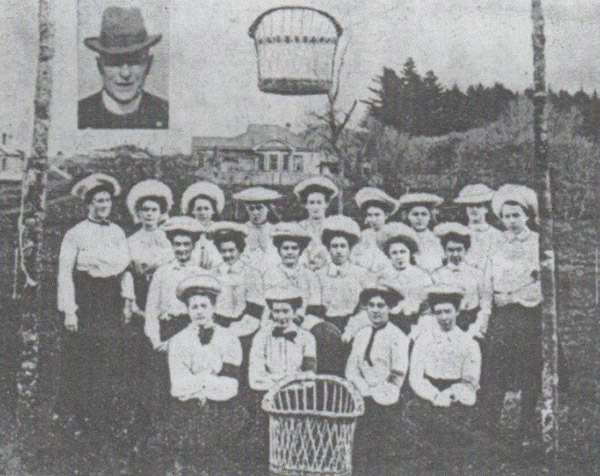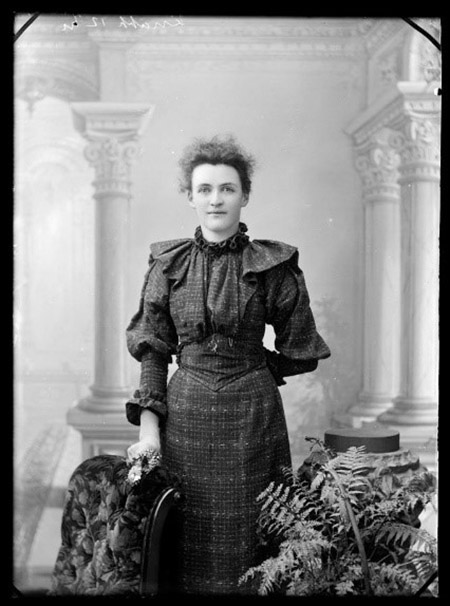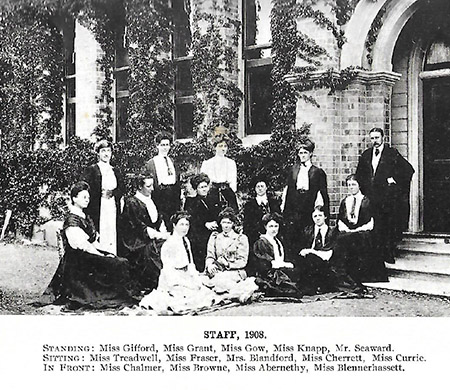As a contribution to the ANZ Premiership Heritage Round, and in anticipation of NNZ’s upcoming centenary next year, we are celebrating the women who pioneered the game in Aotearoa.
Although our game was first introduced and then nurtured by a succession of able and farsighted New Zealand women, they are still largely unknown within the netball community and to the wider public.
The time is well overdue for them to be named, claimed and honoured.
For the first netball history reset – let’s reconsider the possibility that the Rev J.C. Jamieson, Travelling Secretary for the Presbyterian Church in New Zealand, was not the first person to introduce women’s outdoor basketball (netball) to Aotearoa in 1906.
Jamieson’s contribution is still very worthy of acknowledgement but there there is increasing evidence to prove that various forms of outdoor basketball were already being played in isolated pockets throughout Aotearoa which pre-date the St Luke’s Bible class teams coached by Jamieson.

St Luke’s Remuera, Bible Class Ladies A & B basketball teams 1906
It’s always a good bet that behind any advances in women’s early sporting history there is an enterprising and energetic school teacher. This is where the indefatigable Miss Jessie Knapp quietly steps into our netball history.
Jessie was born into one of the first European settler families in Spring Creek, Nelson, in 1871. From a young age she was recognised as having considerable intellectual potential and won a number of scholarships which enabled her to receive secondary school education at the recently established Nelson Girls’ College.
Under the inspirational mentorship of the foundation headmistress, Kate Edger (the first woman in New Zealand and the second in the British Commonwealth to earn a university degree), Jessie received separate tertiary level tutoring in English, French, German, Latin, Mathematics, History, Political Economy and Mental Science to graduate with a BA in 1891.

Jessie Knapp c1887
(Nelson Museum Tyree Studio Collection)
At just 20 years of age, armed with her BA and a B1 Education Department Certificate of Teaching, Jessie began her teaching career which was one of the few vocational paths open to educated women at this time. She learned her craft at a series of primary schools in the wider Nelson area, and infant mistress at Campbell Street School, Palmerston North, before gaining an assistant mistress position at The Girls’ College Wanganui, in 1898.
She remained there for the next 18 years before moving to Gisborne High School as senior mistress in 1916. On her appointement to her new teaching role she was described in The Gisborne Times, 30 August 1916, as having ‘wide experience in games and the outdoor life of girls’ in addition to her impressive academic and teaching qualifications.
During her time at Wanganui Girls’, her love of sport plays a significant role in her professional and personal life. She was a very competitive golfer and tennis player. She belonged to the local croquet club and coached a range of sports clubs in the school.
In 1898, the first documented evidence appears that Jessie Knapp is directly responsible for the introduction of the ‘new game of basket-ball’ into the school. Sadly, this wasn’t an instant success with the Headmistress, Miss Isobel Fraser noting in her annual school report, published in the Wanganui Chronicle, 19 December 1898, that ‘the weather, and other things were against regular play’.
But Miss Knapp perservered and subsequent headmistress reports published in the Wanganui Chronicle in 1899 and 1900 continue to acknowledge her ‘selfless’ dedication to improving the game. Miss Fraser’s 1990 report rather humorously notes that ‘Basket-ball, which went through a somewhat sickly infancy last year, developed into quite a lusty youth this year under the good nursing of Miss Knapp’.

Miss Jessie Knapp, Assistant Mistress, Wanganui Girls' College (2nd from right standing)
The Adastrian, 1908 (supplied)
The sports club reviews in the 1900 school magazine, The Adastrian, indicates that there were now 60 members in the ‘Basket-ball Club’ who were organised into two sets of A and B teams of 9 players each, representing the Day Girls and the Boarders. A small fee was gathered from the members to enable them to purchase ‘two strong baskets and a new ball’ although the latter was a bit of a failure and not as ‘strong as it should have been’.
The enthusiastic adoption of the new game also impressed the Department of Education school inspectors who recorded in their annual report to the Crown, 1 January 1900, that the four basket-ball teams at Wanganui Girls’ College, were in ‘vigorous operation’.
Despite all these reports confirming the healthy state of the new game, once Jessie Knapp relinquished her mentorship of the basketball club in 1901 to concentrate on her tennis coaching, the game seems to disappear. Basketball doesn’t feature in the school records again until 1916 when The Adastrian confirms it was introduced as a ‘new game’ to the school by a recently appointed teacher, Miss Dobbie.
So how did Jessie Knapp, a New Zealand trained teacher significantly isolated by geography and a transport system that still relied on coastal shipping services, know about a women’s version of outdoor basketball only a few years after the inception of the original game in 1891 by American YMCA fitness instructor James Naismith?
She may have seen the game being played in Palmerston North before she took up her position in Wanganui. Or she learned of the game through the close association of female teachers with the early YWCA movement. But it is also likely that she picked up the general principles of an early variation of the women’s game through reading internationally syndicated articles reprinted in the regional press.
By 1897 regular articles published in women’s columns, signalled the introduction of this exciting ‘new game for girls’. It was reported to have ‘swept the United States’ and it was already included in early female teacher training in England. It was frequently described as ‘football played with the hands’ with some articles including a few simple rules and rudimentary diagrams of court layout and player movement.
The chief attraction of the game for women and young girls according to the Otago Witness, 6 May 1897, was its simplicity - ‘wherever two old baskets a couple of clothes props, and a ball are there it can be played’. For Jessie Knapp, it must have offered a cheap and energetic option to keep the Boarders entertained and add variety to the traditional Day Girls/Boarders rivalry. It was also a way of demonstrating her considerable organisational skills and modern outlook in regard to the physical education of young women as she took up her first teaching position in the state secondary school system.
There must have been other ‘Jessie Knapp’s’ experimenting with different versions of the game around the turn of the 20th Century throughout the Dominion, but that evidence is yet to be discovered. But what we do have is an actual name and documented proof that in 1898 Jessie Knapp was responsible for introducing a variant of the early game of outdoor basketball to the pupils at Wanganui Girls’ College – eight years before the St Luke’s Ladies Bible Class A and B teams played each other on a lumpy paddock in Auckland.
Therefore, Jessie Knapp can be considered as one of, if not the first, coach and pioneer of netball in Aotearoa.
There is much to admire about this woman.
Acknowledgements:
My thanks to Megan Wallbutton, a devoted netballer in her youth and volunteer in Wanganui Girls’ College archives, for supplying relevant data from The Adastrian. Also, to Diana Street, Nelson Historical Society, for supplying the beautiful photograph of Jessie Knapp from the Nelson Museum Photographic Collection.
An early iteration of this article was first published in the Nelson Genealogy Society Newsletter in 2022. It is still very much a work in progress and part of a larger project building towards the NNZ Centenary celebrations 2024.
Any contributions from family genealogists or local historians to help build a more comprehensive profile of Jessie Knapp, or for any of our early netball pioneers, would be gratefully received.
Please
Margaret is a lecturer at the University of Auckland who with Professor Toni Bruce is currently engaged in a three-year Marsden Fund research project to investigate netball’s intergenerational, historical and cultural importance in the lives of New Zealand women.